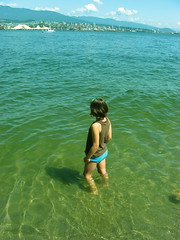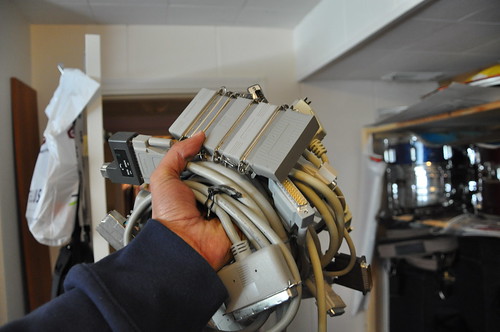Penmachine
23 April 2010
Geek office cleanout redux
Almost five years ago, I cleaned out a bunch of old electronics and cardboard from my office/studio downstairs. Yesterday, Earth Day, I got started on it again, this time shipping out four old CRT monitors, two printers, two desktop Macs, an old PowerBook, a couple of keyboards, a scanner, an external CD-ROM drive, a broken camcorder, and a whole mess of wires:
I had an incentive to do it today because, on her way to work, my wife Air noticed a one-day Earth Day electronics recycling event at Killarney Secondary School, which is where I took the heap. It was gone in less than five minutes.
My happiest discard was a drawer full of particularly beige SCSI cables, adapters, and terminators. If you've grown up connecting things to computers with USB or FireWire or Ethernet cables, or using Wi-Fi, be thankful you didn't have to deal with SCSI and its predecessors, which often required flipping tiny switches, swapping cables around, adding thick cable terminators to devices in apparently random combinations, and fiddling with software—and still often didn't work right. Good riddance, SCSI cables:
I felt like Perseus with the head of Medusa there. And yes, I reformatted my hard disks before donating them.
Labels: apple, geekery, green, home, memories, school
10 October 2007
Greener future?
 British Columbia's Liberal provincial government (not renowned for its environmental record) recently sent out a tabloid-sized, four-page flyer to B.C. residents. We received ours today. The title is "What Choices Would You Make for a Greener Future?: Budget 2008 Consultation Paper" (here's the PDF).
British Columbia's Liberal provincial government (not renowned for its environmental record) recently sent out a tabloid-sized, four-page flyer to B.C. residents. We received ours today. The title is "What Choices Would You Make for a Greener Future?: Budget 2008 Consultation Paper" (here's the PDF).
In essence, it asks us where we think the government should spend money to reduce greenhouse gas emissions, encourage alternative power sources and transportation options, pay for healthcare costs, and provide adequate housing for our fellow citizens.
There is an online version of the questionnaire, which is handy. Overall, it's an interesting and encouraging idea. But before even reading the flyer, I flipped it over and read the fine print:
Normally I would think it wise—indeed expected—for governments to use paper with a reasonable proportion of recycled pulp in it, and 40% isn't bad. But for a flyer talking about a "greener future," using 100% post-consumer recycled paper is the only reasonable choice. I wouldn't care if it was brown or grey rather than stark white.
As it is, the 40% recycled content (or rather, the 60% non-recycled content) makes the whole publication and the process behind it look like lip service to environmental causes. Gillian also notes that there's a whole stack of the flyers in her building's recycling bin next to the mailboxes—a stack that certainly never got read.
While I'm filling out the online questionnaire, I will be wondering where my opinions will be registered, and whether they'll end up 60% watered down as well. It's too bad I ended up thinking so cynically.
Labels: environment, government, green, science
06 September 2007
Vote for this photo
 It's green. If it wins, the digital camera goes to a deserving little girl (my daughter), who will take more nice photos with it.
It's green. If it wins, the digital camera goes to a deserving little girl (my daughter), who will take more nice photos with it.
So vote for the photo by signing up for Flickr (free, or you may already be a member), then going to the picture and making it one of your favourites.
Here's the background for the contest.
Labels: contest, family, green, photography


